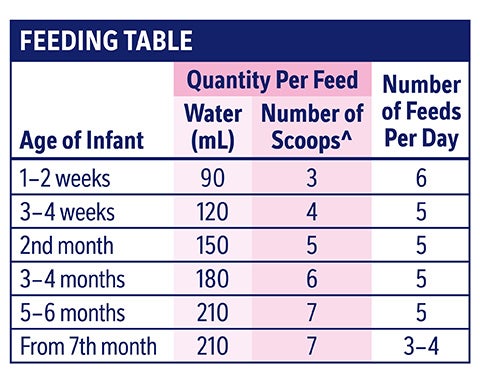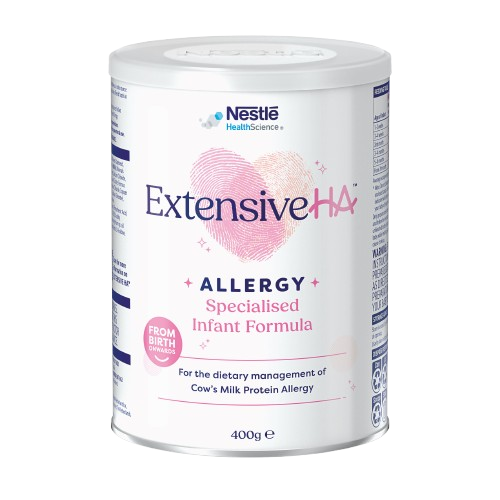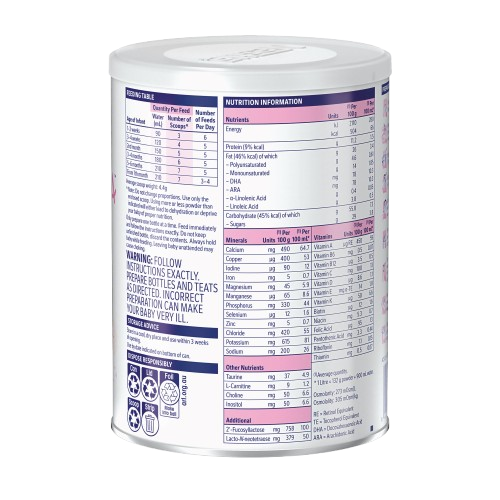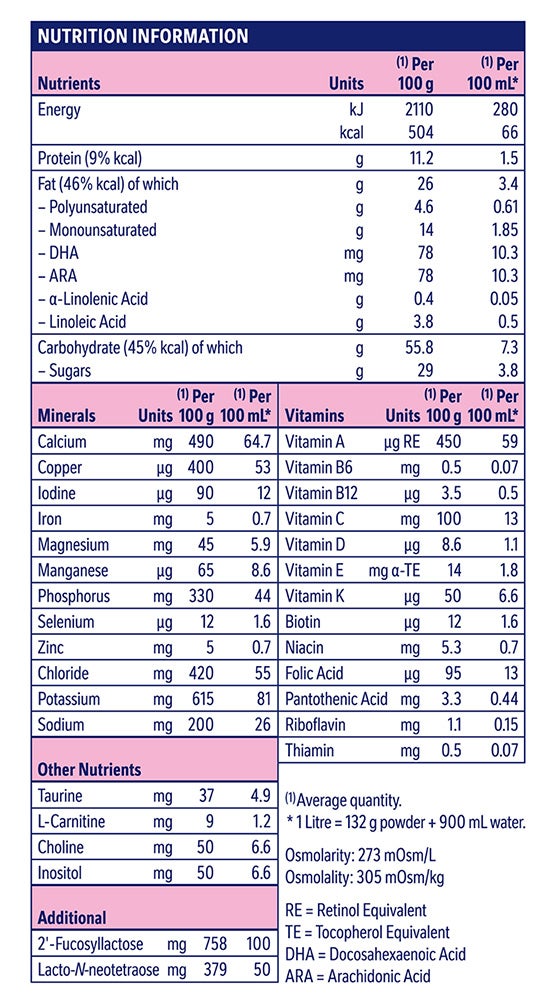EXTENSIVE HATM is a specialised, hypoallergenic infant formula, suitable for mild to moderate Cow’s Milk Protein Allergy (CMPA).
EXTENSIVE HATM is an extensively hydrolysed, whey based infant formula, which is nutritionally complete and suitable as a sole source of nutrition from birth, or supplementary feeding from 6 months of age.
To learn more about Cow’s Milk Protein Allergy read here.
If you are a healthcare professional and require samples for your professional evaluation please click here and follow the short sign up process.
- EXTENSIVE HATM is an extensively hydrolysed formula, which means the protein in the formula is broken down to support the dietary management of allergy symptoms associated with CMPA
- Scientifically researched, advanced formulation suitable for babies with mild to moderate CMPA
- Suitable from birth onwards
- Halal certified
- Available in a 400g size tin
EXTENSIVE HATM is a special medical purpose product for infants, formulated for infants with Cow’s Milk Protein Allergy, for use only under medical supervision. This product is not suitable for general use.
Lactose (Milk), Maltodextrin, Vegetable Oils (Sunflower, Rapeseed, Coconut), Enzymatically Hydrolysed Whey Protein (Milk), Minerals (Calcium Glycerophosphate, Potassium Phosphate, Calcium Chloride, Magnesium Chloride, Sodium Phosphate, Potassium Citrate, Ferrous Sulphate, Zinc Sulphate, Potassium Chloride, Sodium Chloride, Copper Sulphate, Manganese Sulfate, Potassium Iodide, Sodium Selenate), Emulsifier (472), Oligosaccharides (2'-Fucosyllactose, Lacto-N-neotetraose) (Milk), Vitamins (C, E, Niacin, Pantothenic Acid, Riboflavin, A, Thiamin, B6, Folic Acid, K, Biotin, D, B12), Acidity Regulator (330), Mortierella alpina Oil (ARA), Schizochytrium sp. oil (DHA), Choline Bitartrate, Inositol, Taurine, Amino Acids (L-Histidine, L-Carnitine, L-Arginine).
- Wash hands before preparing baby’s formula.
- Wash bottle, teat and cap thoroughly until no formula remains.
- Boil bottle, teat and cap for 5 min. Leave covered until use.
- Boil drinking water for 5 min; allow to cool.
- Consult feeding table, pour exact amount of lukewarm water (40°C) into boiled bottle.
- Only use scoop from this can and level using special leveller at can opening.
- Consult feeding table, add exact number of level scoops for the age of baby. Replace lid firmly.
- Shake bottle vigorously until powder fully dissolved; feed immediately.
- Close the can tightly after each use and store in a cool dry place, before and after opening.

^Do not change proportions. Use only the enclosed scoop.
Only prepare one bottle at a time. Feed immediately and follow the instructions exactly. Do not keep unfinished bottle, discard the contents. Always hold baby while feeding. Leaving baby unattended may cause choking.
WARNING: Follow instructions exactly. Prepare bottles and teats as directed. Do not change proportions of powder except on medical advice. Incorrect preparation can make your baby very ill.
If you have any questions about EXTENSIVE HATM, please contact our consumer care team on 1800 671 628.
More about cow’s milk protein allergy (CMPA)
Of all food allergies, cow’s milk protein allergy or CMPA is the most common one in infancy.
In Australia and New Zealand more than 2% (1 in 50) of infants are allergic to cow's milk*. Most children outgrow cow's milk allergy by the age of three to five years. Although nearly half of the children affected by CMPA grow out of it by 1 year, and two-thirds at 2, we understand that in the initial stages it can be a very challenging time as a parent.
Food allergies such as CMPA can affect anyone, however those infants with a family history of allergy are at higher risk. CMPA occurs when a baby’s immune system reacts negatively to the proteins in cow’s milk.
- If formula-fed, the reaction is to the milk protein in the formula.
- If breastfed, the reaction is due to milk protein in the diet of older infants or it may be due to milk protein passed from the mother through breast milk. Continued breastfeeding is encouraged where possible and your doctor can advise on the most appropriate feeding options, depending upon your baby's symptoms.
In both cases, the cow’s milk protein triggers the body’s immune system to have an allergic reaction. This can cause symptoms that affect the skin, breathing and/or digestive system of your baby. There are two types of allergic reactions:
- IgE mediated –rapid onset allergic reactions and can occur within 15 minutes after consuming cows’ milk or dairy products.
- Non-IgE mediated - delayed reactions to cows’ milk may take up to several hours to days to appear after consumption of the allergen.
If you are concerned that your child may have CMPA, speak with your child’s doctor to discuss symptoms and possible diagnosis. In case of a severe allergic reaction, seek medical assistance without delay. Once diagnosed, CMPA can be effectively managed in consultation with a healthcare professional. The key is to seek support from a healthcare professional as early as possible in the journey to ensure an early and correct diagnosis.
*ASCIA Cow’s Milk (Dairy) AllergyCow`s milk (dairy) allergy - Australasian Society of Clinical Immunology and Allergy (ASCIA)
EXTENSIVE HATM is a special medical purpose product for infants, formulated for infants with Cow’s Milk Protein Allergy, for use only under medical supervision. ALFAMINO® is an infant formula product for special dietary use and must be used under medical supervision. These products are not suitable for general use.
IMPORTANT NOTICE: Breast milk is best for baby and provides ideal nutrition. Good maternal nutrition is important for preparation and maintenance of breastfeeding. Introducing partial bottle feeding could negatively affect breastfeeding and reversing a decision not to breastfeed is difficult. Professional advice should be followed on infant feeding. Infant formula should be prepared and used exactly as directed or it could pose a health hazard. The preparation requirements and cost of providing infant formula until 12 months of age should be considered before making a decision to formula feed.
Mothers should be encouraged to continue breastfeeding even when their infants have cow’s milk protein allergy. If a decision to use an infant formula for special dietary use or special medical purpose product for infants is taken, it must be used under medical supervision.




